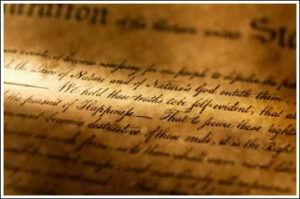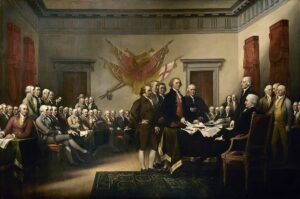[Originally published by Building Blocks for Liberty as "How do we protect our rights?]
 We hold these truths to be self-evident, that all men are created equal, that they are endowed by their Creator with certain unalienable Rights, that among these are Life, Liberty and the pursuit of Happiness. Declaration of Independence.
We hold these truths to be self-evident, that all men are created equal, that they are endowed by their Creator with certain unalienable Rights, that among these are Life, Liberty and the pursuit of Happiness. Declaration of Independence.
As reflected in our Declaration of Independence, and other writings of the period, our Founders believed that rights came from God, not the government. The Founders didn’t believe that governments bestowed rights, nor did they believe governments were an agent to protect rights.
When the Constitutional Convention convened in 1787, the delegates were to “render the constitution of government adequate to exigencies of the union,” but ensure that a stronger government would not become oppressive and undermine rights and personal liberty. They knew that rights were fragile. They can be suppressed by force, gradually eroded, or simply lost through neglect.
The original Constitution didn’t include a Bill of Rights. Many delegates didn’t believe one was necessary. In their minds, rights were not protected by words, but by limiting governmental power. Montesquieu and Hume advocated separation of power into three equal branches, with each branch having potent checks on all of the others.
Although this was a well-established theory at the time, no national government was designed along these principles, and existing state constitutions gave overwhelming advantage to the legislature. Delegates to the convention believed that if they could construct a system consistent with the separation of powers doctrine, limit the national government only to enumerated powers, and effectively set up the states as checks on the national government, then the national government would be unable to trample rights or intrude into peoples’ lives.
 Before the Constitution could become the Supreme Law of the Land, it had to be debated and ratified by conventions of the people. The convention debates — and the media opinion pieces — were at different times thoughtful and raucous, but they were always contentious. Success was never assured.
Before the Constitution could become the Supreme Law of the Land, it had to be debated and ratified by conventions of the people. The convention debates — and the media opinion pieces — were at different times thoughtful and raucous, but they were always contentious. Success was never assured.
One of the anti-Federalist arguments that gained support was that the Constitution was flawed because a Bill of Rights was missing.
Although not a legal condition of ratification, several conventions approved the Constitution based on a promise that a Bill of Rights would be added. The First Congress proposed, and the states ratified ten amendments to the Constitution which we now call the Bill of Rights.
A bill is a list, but is the Bill of Rights a list of government guaranteed rights? No. These ten amendments remained consistent with the Founding principles. Read the first eight amendments. They are filled with phrases like Congress shall make no law, shall not be infringed, shall not be violated, nor be deprived, shall not be required.
These are not rights generously bestowed by government, they are directives from We the People to the government — orders not to infringe upon our God-given rights.
If the first eight weren’t clear enough, our Founders added two more amendments.
9th: The enumeration in the Constitution, of certain rights, shall not be construed to deny or disparage others retained by the people.
10th: The powers not delegated to the United States by the Constitution, nor prohibited by it to the States, are reserved to the States respectively, or to the people.
 Today, rights are at risk because power has been concentrated in the executive branch. Rights cannot be abridged unless government possesses unchecked power. Our American heritage is to fear concentrated power, so those who seek control have convinced many that the government grants and guarantees rights.
Today, rights are at risk because power has been concentrated in the executive branch. Rights cannot be abridged unless government possesses unchecked power. Our American heritage is to fear concentrated power, so those who seek control have convinced many that the government grants and guarantees rights.
They are in essence saying that there is nothing to fear here — we are the ones that make you free, and we can even enlarge your freedoms.
Except that this has never been true in the history of the world. Oppression has always come from government. To protect our rights, we need to:
* Re-instill the Founders fear of powerful government
* Once again make the states an effective check on the national government
* Re-establish the Constitutional checks between the branches
* Restrict the national government to its enumerated powers
Last, but most important, we must elect people who accept as true that unalienable rights come from the Creator, not the government.
by James D. Best
For Building Blocks for Liberty
